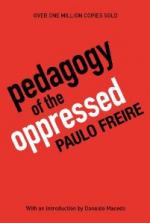
|
| Name: _________________________ | Period: ___________________ |
This test consists of 15 multiple choice questions and 5 short answer questions.
Multiple Choice Questions
1. Why does Frier use the example of Mr. Giddy?
(a) As an example of critical thinking.
(b) As an example of fully humanized thinking.
(c) As examples of Oppressive thinking.
(d) As an example of one of the Oppressed.
2. What is the purpose of critical pedagogy?
(a) To oppose oppression.
(b) To look out for failing students.
(c) To spread a religion.
(d) To inspect schools.
3. Who or what is the 'ruling elite'?
(a) A way of governing schools.
(b) The governors of society who also enjoy luxury and freedoms not permitted to the oppressed.
(c) A type of fascist government.
(d) The masses.
4. How are philosophy and critical consciousness linked?
(a) Philosophy has a passing relevance to critical consciousness.
(b) Philosophers always encourage critical thinking.
(c) Philosophy helps study principle truths and statements.
(d) It isn't.
5. What does the author mean by the fear of freedom?
(a) The mistaken idea of what being free looks like.
(b) Being allowed to say what you like.
(c) Fear of authority figures.
(d) The fear of being thrown in jail.
6. What is propositional thinking?
(a) Talking about marriage.
(b) Talking about politics.
(c) Talking mostly fantasies.
(d) Analyzing an argument in terms of its fundamental propositions (or positions).
7. What is the job of the Preface?
(a) To tell the readers what they should know.
(b) To warn readers.
(c) To act as a government health warning.
(d) To inform the reader of the later ideas of the book.
8. What, according to Friere, must the Oppressed have the courage to do?
(a) To go to school.
(b) To overthrow the system of oppression.
(c) To challenge one another.
(d) To attack the ruling class.
9. How important is critical thinking to Friere?
(a) Not very.
(b) To some degree.
(c) It is the most natural human imperative.
(d) Not at all.
10. What is a critical consciousness?
(a) An overly suspicious mind.
(b) A high achiever.
(c) An overly argumentative person.
(d) A view that questions everything around itself.
11. What is a poverty of the mind in this context?
(a) A lack of education.
(b) A lack of guidance.
(c) The lack of ways to imagine ones situation.
(d) A lack of intelligence.
12. What is a 'culture of oppression' according to Friere?
(a) Televisual society.
(b) European government.
(c) When entire societal views, media and beliefs that are based around maintaining class structure.
(d) American Senate system.
13. Who are the Oppressors?
(a) A music group.
(b) Those at the bottom of society.
(c) A type of soldier.
(d) Those in charge of society.
14. What does Friere maintain in the Preface that his readers must be ready for?
(a) The time of their lives.
(b) Change.
(c) Anything.
(d) Revolution.
15. What is an a-priori truth?
(a) A truth that is hidden an very few people know.
(b) A fundamentally correct and undeniable truth.
(c) A truth that everyone knows.
(d) A fraudulent truth.
Short Answer Questions
1. What is Friere's conception of the static reality?
2. Who will become freed when the Oppressed rise up?
3. What does Paolo Friere mean by critical thinking?
4. What is Mr Giddy's view on education?
5. What is the goal of critical consciousness?
|
This section contains 575 words (approx. 2 pages at 300 words per page) |

|




